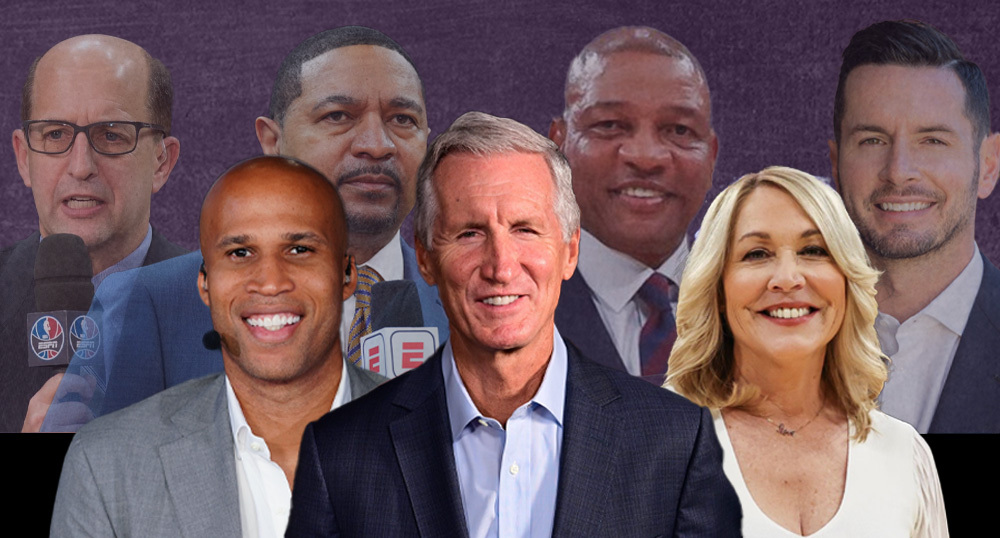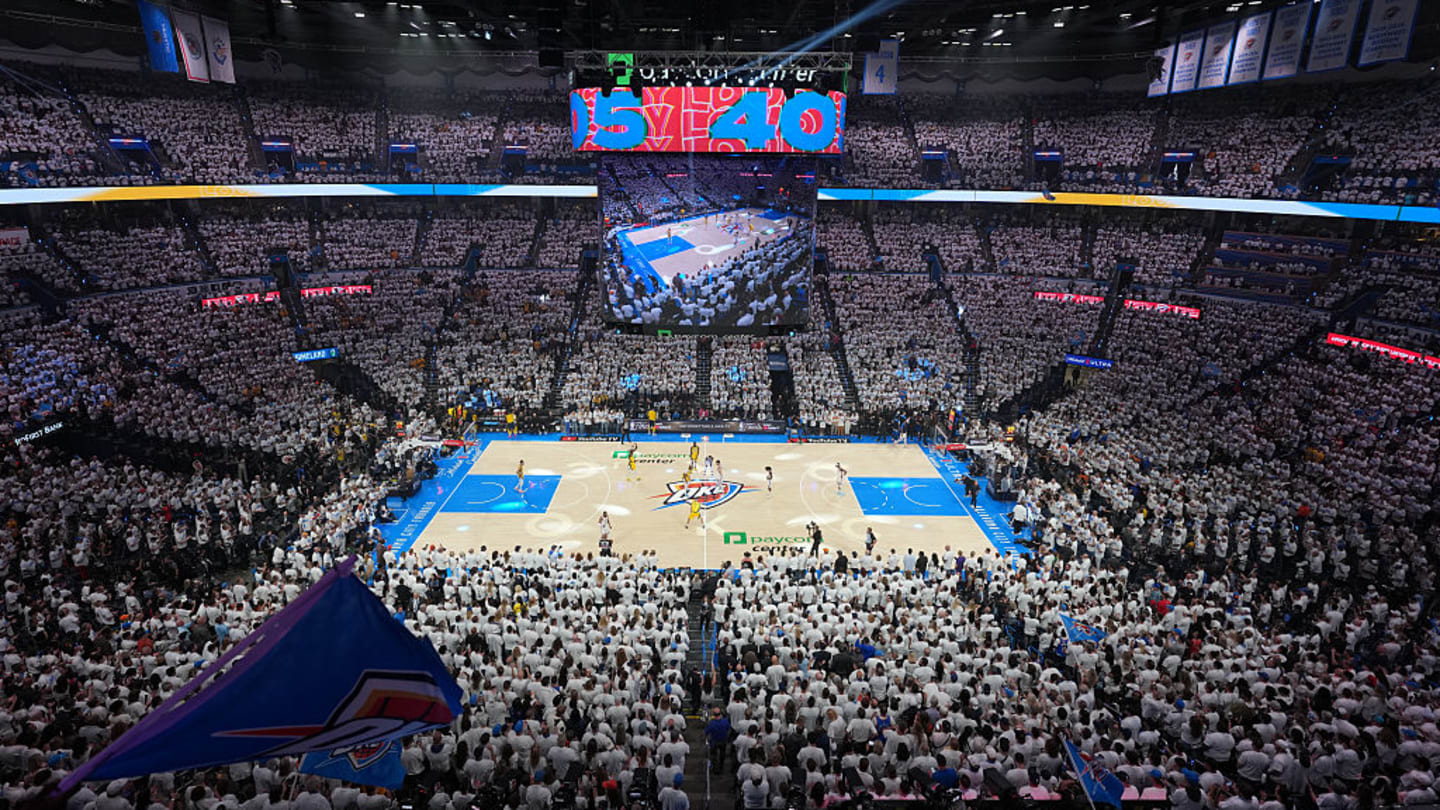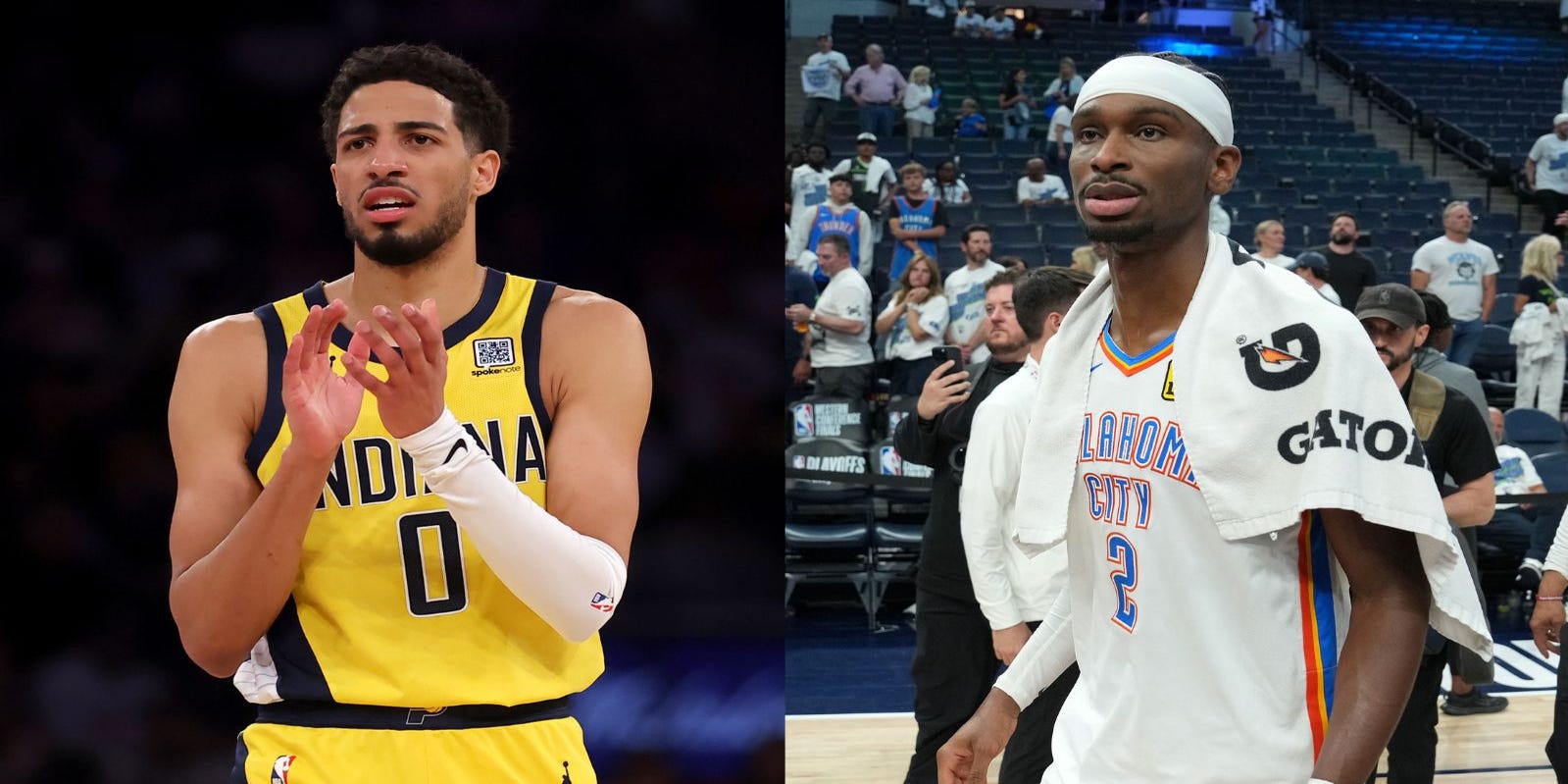
Just like American politics always finds a way back to Ronald Reagan, the NBA always finds its way back to Doc Rivers.
He’s a main character, whether he wants to be or not.
The veteran head coach took over the Milwaukee Bucks in the middle of last season, just months after sliding into ESPN’s top NBA booth. And Doc leaving the booth before the season even hit its second half is exactly why we’re here, trying to make sense of a broadcast team that’s somehow still in flux during the NBA Finals.
NBC and Amazon, both building out ambitious coverage plans, are suddenly better positioned — on paper — to carry the NBA into its next media era. That never should’ve happened. ESPN had the rights. They had the platform. They even had the plan: move on from Jeff Van Gundy and Mark Jackson, inject new life into the booth, and try something fresh. That idea, in theory, wasn’t bad. Breen, Burke, and Rivers? There was something there. It was building. Until it wasn’t.
When ESPN finally gave Doris Burke a well-earned shot in the lead analyst chair, it was supposed to be different. And it was, at least for a moment. Her chemistry with Rivers popped early. She keyed into game flow, found trends, and built narratives. That’s her superpower. When a storyline peaked late in the third quarter or early in the fourth, Burke had already drawn the viewer to it two quarters earlier. You don’t just arrive at the moment; Burke carries you to it. That’s what separates her.
And Doc? He let her cook. He laid out. He didn’t step on her analysis or turn every segment into an anecdote about the 2008 Celtics. For someone who hadn’t called games in 20 years, that’s a win. More importantly, for someone with a career full of ego-driven locker rooms, he had the humility to defer to a woman leading a marquee sports broadcast. That shouldn’t be noteworthy in 2024, let alone 2025, but let’s be honest, it still is.
Together, they worked. Breen still had his rhythm. Rivers brought raw insight and candor. And Burke gave the broadcast its intellectual engine. It wasn’t polished yet, but it was getting there.
Then Rivers bailed.
What followed was a rushed pivot to JJ Redick, a rising star in the sports media world, and someone who had long seemed destined to sit in that chair. It worked. Not in the same way, but in a new way. Redick was assertive, confident, and more analytical than emotional. If Rivers was talking from the gut, Redick was talking from the film room. And Breen again adjusted. Burke again found her groove. It wasn’t perfect, but it was promising.
And then? Redick took the Lakers’ job.
Enter Richard Jefferson.
This isn’t really on him. He’s stepping into a spot he didn’t ask for, trying to steady a booth that’s already been through two resets in less than a year. But Breen, Burke, and Jefferson just haven’t found it. There’s no rhythm. No flow. It’s three smart people calling a game, but it rarely feels like a group. More like three soloists waiting for their turn.
Part of that’s on ESPN. A three-person booth only works when roles are clearly defined, and right now, there’s no real pecking order. It’s an awkward dance. No one seems sure who leads.
Burke, for all her strengths, has had some rough moments. During Game 4 of the Western Conference Finals, she somehow brought up France, Germany, World War I, and World War II while discussing Isaiah Hartenstein and Rudy Gobert. It was weird, and not in a good way, either. Later in that same game, she dubbed Shai Gilgeous-Alexander a “free-throw merchant,” which landed awkwardly enough that it made the rounds on social media.
Doris Burke: “And I don’t know much about history, but I know the French and German don’t like one another. And Rudy says, ‘Bonjour, Mr. Hartenstein!’ Have a little bit of that left-handed dunk!”
Mike Breen: “What are you trying to start here?” 🏀🎙️ #NBA #NBAPlayoffs pic.twitter.com/uSVH3KzW88
— Awful Announcing (@awfulannouncing) May 27, 2025
“This is why he’s called the free-throw merchant.” – Doris Burke on Shai Gilgeous-Alexander 🏀🎙️ #NBAPlayoffs #NBA pic.twitter.com/FehnQgKmWs
— Awful Announcing (@awfulannouncing) May 27, 2025
Jefferson had a rough stretch before Game 3. He stumbled through a Jalen Williams breakdown, then followed it up with a joke about being on suicide watch. It was clearly meant to be offhanded and funny, but it didn’t really land that way.
Richard Jefferson stumbled through a Jalen Williams breakdown ahead of Thunder-Timberwolves Game 3 on ABC. 🏀🎙️ #NBA #NBAPlayoffs pic.twitter.com/Drl5ZCFG9p
— Awful Announcing (@awfulannouncing) May 25, 2025
Is Richard Jefferson OK??? pic.twitter.com/XvfSZXDGIQ
— Justin Russo (@FlyByKnite) May 25, 2025
Two nights later, as the Thunder blew out the Timberwolves in Game 5, he and Breen ran out of things to say with seven minutes still on the clock.
“There’s still a lot of time. Let’s see, what can I ask you? So, how did you get into the business?”
“I couldn’t jump like these young guys anymore. So I thought it was time for a new job.”
Mike Breen and Richard Jefferson are running out of things to talk about. pic.twitter.com/Np4c2WNILo
— Awful Announcing (@awfulannouncing) May 29, 2025
“It constantly feels like this awkward dance where no one quite knows what the order of operations is going to be,” Awful Announcing’s Brendon Kleen said on The Play-By-Play podcast.
Exactly.
And the wildest part? ESPN blew up the Breen-JVG-Jackson booth because they didn’t want guys who might jump back into coaching. And then Doc did. And then JJ did. They talked themselves into this plan, convinced it would work, and now they’re left patching it back together on the fly.
The booth has become a quagmire, not unlike the Monday Night Football carousel that plagued ESPN before Buck and Aikman arrived from Fox. A rotating cast of voices, none of whom could find the right blend of credibility, chemistry, and comfort. Sound familiar?
So is ESPN’s NBA team now looking for its own Troy Aikman, a permanent partner to sit next to Breen and Burke and finally settle the room?
They thought they had it. Twice.
Rivers, for all the noise around him, brought real presence. He wasn’t polished, but he was sharp. You believed him. He sounded like a guy who had seen things, and he had. He challenged players. He challenged refs. He challenged narratives. And he did it in a voice that didn’t always feel TV-friendly, but felt real. Authenticity matters. Especially in a sport built on star power and swagger.
Redick, too, made sense. He was modern. He was confident. He had a future in that chair, and maybe still does. But you can’t keep giving viewers something and then yanking it away midseason. At some point, stability has to matter.
The original booth, Breen, Jackson, and Van Gundy, worked because everyone knew their role. Breen played point guard, Jackson filled space, and JVG cut through it all with sardonic precision. It wasn’t everyone’s cup of tea, but it was predictable. And there’s value in that. Predictability means comfort. Comfort means trust.
Breen, Burke, and Rivers worked because it felt like a new team trying to build something bigger than the sum of its parts. There was mutual respect, shared space, and real potential.
Breen, Burke, and Redick worked because it was fresh and intellectually engaging. You saw the growth.
Breen, Burke, and Jefferson haven’t had the same time to grow. It’s still early, and the pieces haven’t quite clicked yet. They’re all talented in their own right, but the chemistry just hasn’t settled. And with Jefferson’s contract reportedly set to expire after this season, it feels more like a stopgap than a solution.
And in the NBA Finals, where the storytelling and rhythm should feel seamless, ESPN’s top booth still feels like it’s searching for its voice.

